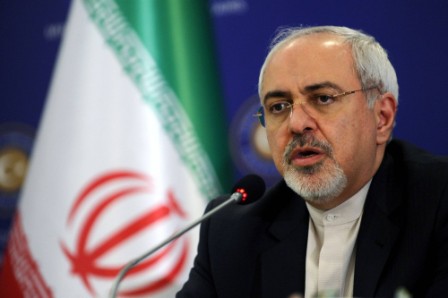Iranian FM's visit to Turkey cancelled at last minute
Ankara
Iranian Foreign Minister Mohammad Javad Zarif on Tuesday postponed a scheduled visit to Turkey, a Turkish foreign ministry official said, with mystery surrounding the reason for the last-minute cancellation.
The visit on Tuesday had been expected to touch on the Syria crisis, which has caused profound disagreements between Tehran and Ankara with Iran one of the last allies of Turkey's arch foe President Bashar al-Assad.
"There has been a change in the programme," the Turkish official said, without giving any reason. Zarif had been due to meet Turkey's leaders in the capital Ankara on Tuesday.
The postponement of the visit came as Turkish opposition daily Cumhuriyet published a page-long article by Zarif written in apparent anticipation of the trip.
The newspaper is known to be opponent of the ruling Justice and Development Party (AKP) policies, with President Recep Tayyip Erdogan repeatedly locking horns with its editor-in-chief Can Dundar.
In the piece published Tuesday, Zarif criticised US policies in the Middle East, and blamed the emergence of extremist groups including the Islamic State (IS) group on US-led war in Iraq in 2003.
He wrote that the IS group was fed by the chaos and instability after the Iraqi invasion.
- 'Veiled criticism' -
"Extremist elements found a convenient environment during the Syrian crisis with the support they received from individuals, organisations and governments in the region and turned into a giant structure in pursuit of fake causes and ideals," the minister wrote.
"Today, those elements are threatening even their own founders and supporters."
It was not clear if his comments were a veiled criticism of Turkey which has been accused of failing to do enough to halt the rise of Islamic State and even secretly colluding with the group. Ankara vehemently denies the claims.
A NATO member, Ankara had long refused to participate actively in the anti-IS operations led by the United States for fear of supporting the Kurdish fighters battling the jihadists on the border in Syria.
But it changed its position after a deadly bombing blamed on IS on July 20 in Suruc, a Turkish town opposite the Syrian flashpoint of Kobane, that left 32 people dead.
Last month Turkey agreed to open up a southern airbase to US and coalition forces for bombings against Islamic State militants.
Shiite Iran has urged overwhelmingly Sunni Turkey to respect Syria's sovereignty in its bombing of IS targets.
In a telephone call with Erdogan last week, Iranian President Hassan Rouhani suggested that Turkey should "coordinate" attacks with both Syrian and Iraqi governments.
In the article, Zarif also criticised US-led "Greater Middle East" project for preparing the ground for military interventions in the region.
Turkey was once considered a key actor in the initiative during the presidency of George W. Bush, seen as a predominantly Muslim country with a working democracy.
Related Posts

